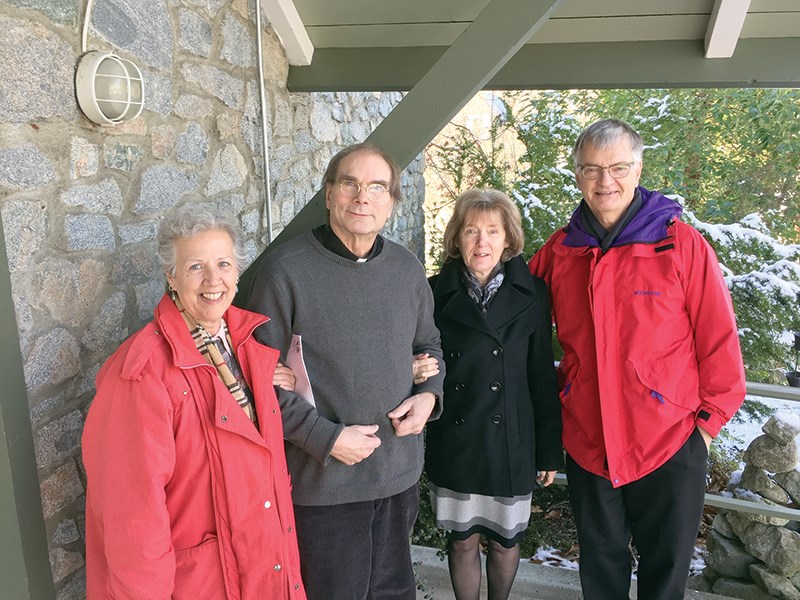A house has been furnished, bank accounts are set up and a group of local volunteers have been working for months to give a third Syrian refugee family planning to settle in Powell River the softest landing possible. Now all that needs to happen is for them to get here.
The family of five, a mother, father and three children, known simply by the mother’s name as Mezgin’s family, are currently on hold in the city of Erbil in northern Iraq, their fate in question as the situation in that country escalates.
The process of getting a refugee family resettled in Canada is a lengthy one. In response to the Syrian crisis of 2015, umbrella group Welcome Refugee Powell River was formed and various churches began fundraising and obtaining what is known as Sponsorship Agreement Holder credentials.
In 2016, the first two Syrian families came to Powell River with the support of the local Catholic and Evangelical/Baptist churches.
The application to bring a third family was started with the Parish of St. David and St. Paul in December 2016 through the Anglican Diocese of New Westminster. It was thought that the family would arrive before the end of 2017.
According to Diocesan refugee coordinator Shakuntala Soden, the Diocese has a formal agreement with Immigration, Refugees and Citizenship Canada (IRCC) to authorize sponsoring groups.
“The Diocese receives a yearly allocation allowing it to authorize a few sponsorships per year and has been authorizing refugee sponsorships since the late 1980s,” said Soden.
Soden adds that the sponsoring group “is completely responsible for the financial, practical and emotional aspects of settlement when the refugees arrive in Canada for a period of at least one year.”
Mezgin’s family is Kurdish/Syrian and originally from Quamishli, a Syrian city that borders Turkey. After an increase in ISIS and sectarian fighting in the region, the family fled east to Iraq in February 2015, settling in Erbil, the capital of Kurdistan, where they applied to the United Nations High Commissioner for Refugees and received refugee status. They became part of the more than five million Syrians that have escaped their country and approximately 250,000 Syrians now living in Iraq.
“The Kurds were promised a homeland after World War I, and they never got it," said Parish of St. David and St. Paul outreach chair Lee Coulter, adding that there are about 40 million Kurds spread over Turkey, Syria, Iraq and Iran.
In September, Kurdistan took an independence vote, which displeased the Iraqi government, according to Coulter.
“What they have done, partly in retaliation, is they have shut down the Erbil airport to international travel,” said Coulter.
This has been the next hurdle for the third family hoping to settle in Powell River, as once the sponsorship in Canada is approved the refugees' application for permanent residence is processed at an overseas mission, according to IRCC spokesperson Rémi Larivière.
The Canadian embassy handling the family’s case is more than 1,000 kilometres away in Amman, Jordan. This delegation is also having difficulty getting in contact with the family to complete the final health and security checks before issuing their flight tickets.
“It’s very hard to get information,” said Coulter. “Telephone communication is very iffy.”
The family would normally fly out of Erbil to Istanbul, then Toronto, Vancouver and finally to Powell River.
“Because they’re Kurds, it’s not safe for them to travel to Baghdad and to fly out that way," said Coulter. "So everything is on hold until this situation between the Kurds and the Iraqis gets resolved, at least to the point of reopening the airport."
Reverend Faun Harriman, vicar of St. David and St. Paul, said she believes our expectations of how systems work in Canada is very different from the rest of the world.
“We expect things are going to be quick, like the Internet," said Harriman. “We take for granted bureaucracies here; when you have a civil war you don’t have a bureaucracy. Everything is operated within a war. I don’t know how they do it. The government is fractured.”
When the family does arrive in Powell River, resources and support services will be made available to them.
Career Link manager Brodie D’Angio said the services that his organization provides, along with others under the umbrella of Powell River Employment Programs Society, are excellent resources for new Canadians. These include Powell River Immigrant Services, Literacy Outreach and many family programs.
“When people come to town as newcomers, they should know that we’re here to support them,” said D’Angio.
As the town awaits the family’s arrival, thought now to be as late as May or June of this year, Harriman is enthusiastic about the work that has already been done.
“What a great opportunity for this community to actually be able to do something on a global scale,” said Harriman. “We’re in Powell River, it’s amazing and we have a beautiful home for them here.”



